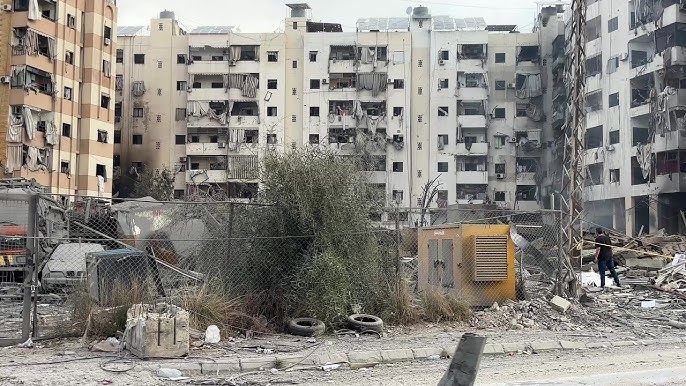
The southern suburbs of Beirut are reportedly seeing an unprecedented wave of real estate sales amid rising tensions between Israel and Hezbollah. A political and military stronghold of the pro-Iranian militia, this densely populated area was heavily targeted during the fall 2024 war and continued to face strikes even after the ceasefire reached on November 27 of that year. Recent increases in Israeli drone overflights have further heightened fears of a new conflict or, at the very least, a return to large-scale Israeli strikes.
According to a report published by the Pan-Arab daily Asharq Al-Awsat, apartment listings are on the rise in neighborhoods such as Rweiss, Borj el-Barajneh, and Sainte-Thérèse. Many residents prefer to sell at a loss rather than risk losing everything, as several buildings suffered repeated damage during the last war. The same source notes that local real estate agencies report an average price drop of between 20 and 40 percent, a direct consequence of ongoing insecurity and the displacement of thousands of families to surrounding or mountainous areas.
The price per square meter in the heart of the suburbs is now estimated at between $500 and $700, down from $1,300 to $1,500 previously. In more sought-after neighborhoods, such as Hay el-Amerkan or Sainte-Thérèse, it has fallen from around $2,500 to $1,000. Brokers note, however, that demand remains weak, with potential buyers limited to a few wealthy investors betting on a future market recovery or hoping to resell at a high price after the war.
Mass Exodus and Widespread Destruction
Israeli strikes, particularly those in June and the fall of 2024, inflicted heavy damage on the southern suburbs despite the ceasefire agreement reached between Israel and Hezbollah in November of that year.
The World Bank estimates that more than 162,000 residential units were destroyed or damaged in Lebanon. Meanwhile, the Hezbollah-affiliated organization Jihad al-Binaa reports a higher figure of over 348,000 units, as Israeli strikes against Hezbollah continue.
Nearly a year after the conflict, residents have yet to receive full compensation for their losses. Only temporary aid for relocation or furniture has been provided.
With Israeli overflights continuing daily across Lebanese territory, the prospect of a military escalation remains a major concern for the population.
This mood of instability has turned the southern suburbs of Beirut, long regarded as a hub of community cohesion, into a slumping real estate market, overshadowed by the fear of another cycle of destruction.



Comments